Abortion law in Northern Ireland set to change
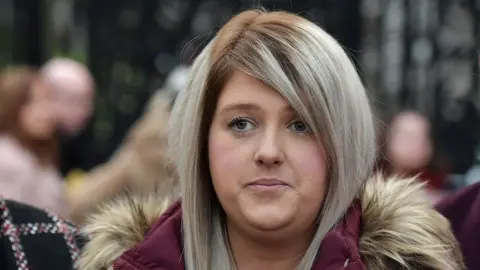 Getty Images
Getty ImagesAbortion is usually the most sensitive and personal of issues - but in Northern Ireland, it's possibly the most contentious and complex issue in the public domain.
For 52 years, the law on terminations has been much more restrictive in this part of the UK than in England, Scotland and Wales.
But that's set to change in a month.
Legislation brought in by MPs at Westminster means abortion will be decriminalised - and the government will have to put in place regulations for abortion services by next April.
There's one proviso - the new law won't take effect if the devolved government at Stormont is restored by 21 October.
Same-sex marriage will also be legalised in Northern Ireland if devolution doesn't return.
Campaigning on the two issues has been particularly intense in Northern Ireland in recent years, as laws have been liberalised in the rest of the UK and the Irish Republic.
'Cooler boxes'
The story of one woman who travelled to England for a termination reframed the debate.
Sarah Ewart went for a scan when she was 19 weeks pregnant.
"My husband and I found out that our little girl had a condition called anencephaly, which meant she wasn't going to survive outside the womb," she said.
"When we told the hospital we no longer wanted to continue with the pregnancy, they said they couldn't help us with the way the law stood here - if they gave us any information they could be prosecuted.
"We were shocked, devastated, and very scared - because we didn't know where to go or what was going to happen next."
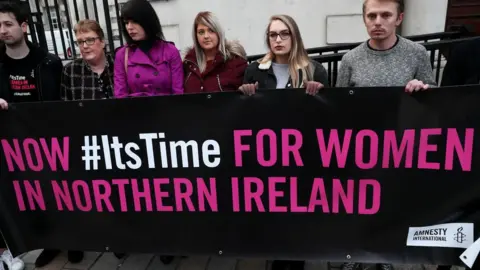 PA Media
PA MediaMrs Ewart had an abortion in London.
"Nobody knew me and nobody knew my medical background - which terrified me," she said.
"When we came home, we then realised we could have arranged to bring home my little girl's remains - but unfortunately we didn't know to do that.
"Others have had to bring their little ones home in cooler boxes.
"I have no grave to visit - I have no memory of her other than pictures and scans, which is absolutely heartbreaking."
She said it was neither a political nor a religious issue.
"I just want to know that if I am in the same situation myself, I will get the treatment I need in my local hospital," she added.
Abortion pills
The 1967 Abortion Act - which made terminations legal - was never extended to Northern Ireland.
Abortion is only permitted in circumstances where continuing a pregnancy would mean there's a serious and permanent risk to a woman's health.
 Getty Images
Getty ImagesIn 2017-18, 44 terminations were carried out in Northern Ireland - with its estimated population of two million.
In contrast, 205,000 abortions were carried out in England and Wales, which have an estimated population of 59 million.
While there are more than 30 times as many people living in England and Wales as Northern Ireland, the number of abortions is 4,500 times higher.
However, every year hundreds of women cross the Irish Sea to have their pregnancies terminated.
In 2018, 1,053 women from Northern Ireland had abortions in England and Wales.
Fewer than 10 had terminations in Scotland, according to Scottish NHS statisticians.
These figures do not include the numbers of women who take abortion pills bought online.
Post-abortion care
Over the last few years, the issue has been kept under the spotlight by legal cases, Westminster decisions and a referendum in the Republic of Ireland.
The new legislation has come about through an amendment proposed by the Labour MP Stella Creasy to a bill relating to the governance of Northern Ireland.
A majority of MPs backed it in July.
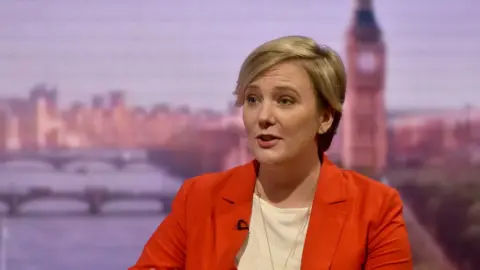
So the law will change on 22 October - unless the Stormont executive is restored before then.
Sections 58 and 59 of the Offences Against the Person Act 1861 - which make abortion a criminal offence - will be repealed in Northern Ireland.
The amended Northern Ireland (Executive Formation etc) Act 2019 also puts a duty on the government to implement the recommendations of a report by the UN Committee on the Elimination of Discrimination Against Women (Cedaw), published in 2018.
The report said abortion should be legalised where there was a threat to a pregnant woman's mental or physical health, without the conditionality of "long-term or permanent" effects.
It recommended terminations should be permitted in cases of rape or incest.
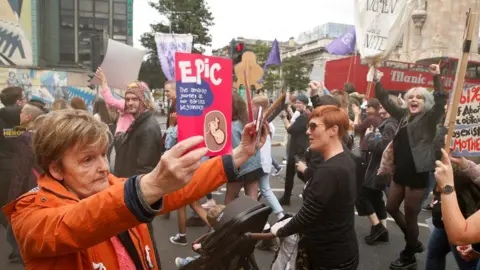 Reuters
ReutersThe committee also said abortions should be allowed where there was "severe foetal impairment" but that provision should not "perpetuate stereotypes" towards disabled people.
It added social and financial support should be ensured for women who decided to carry such pregnancies to term.
A further series of recommendations included providing access to "high quality abortion and post-abortion care in all public health facilities", and making "age-appropriate, comprehensive and scientifically accurate education" on "sexual and reproductive health and rights" a compulsory part of the curriculum.
The government will decide on more detailed measures to fulfil the requirements of the legislation.
Northern Ireland Secretary Julian Smith is mandated to put regulations in place by 31 March 2020.
Matter of conscience
Northern Ireland has been without a government since January 2017, when the power-sharing coalition collapsed, and campaigners who want to retain the current law are focusing their efforts on encouraging parties to get back into Stormont before 21 October.
Marion Woods, from Both Lives Matter, said: "We're under no illusion that this debate will come to Stormont again.
"But what we're saying is this should happen on the floor of the assembly with our elected politicians, who represent people in Northern Ireland."
 Reuters
ReutersNorthern Ireland's biggest party, the Democratic Unionist Party (DUP), wants to retain the current law.
"The DUP is a pro-life party," it said. "Abortion should be a matter for the NI Assembly."
The DUP's former power-sharing partner, Sinn Féin, supports the legalisation of abortion in the circumstances recommended by the Cedaw report.
The other three main parties at Stormont - the Ulster Unionist Party, the SDLP and Alliance Party - treat the issue as a matter of conscience for individual politicians.
A new party with the slogan "Irish Republicans for Protection of Life" has begun to stand in elections north and south of the Irish border.
'Robust legal protection'
Aontú's first elected representative in Northern Ireland is recently-retired GP Dr Anne McCloskey - who won a seat on Derry and Strabane District Council earlier this year.
Northern Ireland's "strong pro-life laws" had saved 100,000 lives since the introduction of the 1967 Abortion Act in England, she said.
"Your human worth is not a function of someone else's requirements or someone else's choice - we are all innately important because we are all members of the human family," she said.
Dr McCloskey says that if the abortion regime changes, there must be "robust legal protection" for people working in the NHS who do not want to be involved in abortions.
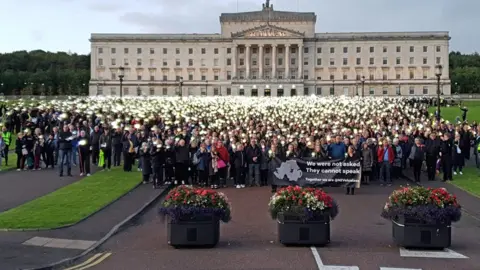 PA Media
PA MediaThe issue of conscientious objection is likely to become more prominent when the government considers how to regulate abortion.
Grainne Teggart from Amnesty - which has campaigned for the law to be liberalised - said "decriminalisation does not mean deregulation".
"It means this issue will be treated as a healthcare matter - not a criminal justice matter," she added.
If the law does change, Both Lives Matters will continue campaigning.
"If we had the best services in place, we believe we could maintain a culture which is life-affirming, so that no woman feels she has no other option than to choose abortion," said Marion Woods,
No matter what happens in October - there will not be an end to this sensitive, heartfelt, emotive debate.
